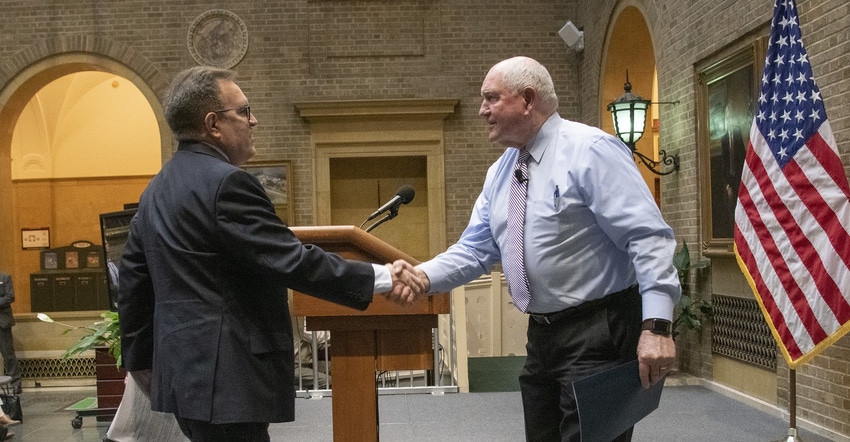Goal of program is maintaining or improving crop yields while reducing environmental footprint.

The U.S. Environmental Protection Agency and the U.S. Department of Agriculture announced the Next Gen Fertilizer Challenges, a joint partnership and competition to advance agricultural sustainability in the U.S. The competition includes two challenges that seek proposals for new and existing fertilizer technologies to maintain or improve crop yields while reducing the impact fertilizers have on the environment.
In a joint call on Wednesday morning, EPA Administrator Andrew Wheeler and Agriculture Secretary Sonny Perdue touted the leadership of the agriculture industry in adopting new technologies and advancing stewardship and sustainability efforts.
“The shared goal here is to accelerate the development of next-generation fertilizers for corn production that can either maintain or increase crop yields while reducing environmental impacts to our air, land and water,” Wheeler said.
Perdue added that this challenge will stimulate innovation and aligns with the Agriculture Innovation Agenda announced by USDA earlier this year in which the agency seeks to stimulate innovation to achieve the shared goal of increasing agricultural production by 40% while cutting the environmental footprint in half by 2050.
Along with EPA and USDA, the competition is coordinated with The Fertilizer Institute, the International Fertilizer Development Center, the National Corn Growers Assn. (NCGA) and The Nature Conservancy.
NCGA president Kevin Ross said corn farmers are committed to sustainability and saw this as a great opportunity to partner with USDA and EPA to bring new technologies to the farm. He said farmers have already adopted major changes, including no-till and cover crops, and look forward to continuing to advance ways to improve their environmental footprint.
“Farming better is a journey, not a destination,” Ross said, adding that the mission of maintaining yields without driving costs for farmers is important, and he feels confident in the success of the program.
Lara Moody, vice president of stewardship and sustainability at The Fertilizer Institute, said the industry has worked with farmers for more than a decade to advance the principles of 4R Nutrient Stewardship: source, rate, time and place. “Enhanced-efficiency fertilizers [EEFs] and formulations can increase plants’ ability to use fertilizer and reduce nutrient loss,” Moody said. “We’re glad to be part of the solution for American farmers.”
Nitrogen and phosphorus fertilizers applied without consideration of the principles of the right source, rate, time and place can have harmful effects on environment and human health. EEFs and other new product technologies and formulations control fertilizer release or alter reactions that can increase nutrient uptake by the plant and reduce nutrient losses to the environment. EEFs and other related technologies can be an important addition to a conservation practice system that helps reduce the impact of row crop agriculture on the environment while maintaining or increasing agricultural productivity and profitability.
The first challenge -- EEFs: Environmental & Agronomic Challenge -- aims to identify existing EEFs that meet or exceed certain environmental and agro-economic criteria. EEF is a term for new formulations that control fertilizer release or alter reactions that reduce nutrient losses to the environment. This challenge will not have a monetary prize, but winners will receive scientific evaluation of their product and recognition from EPA, USDA and other collaborators and participants.
The second challenge, the Next Gen Fertilizer Innovations Challenge, aims to generate new concepts for novel technologies that can help address environmental concerns surrounding agriculture practices while maintaining or increasing crop yields. A panel of expert judges will review the submissions. Each winner will receive at least $10,000.
The Next Gen Fertilizer Challenges open Aug. 26, 2020. Registrants must submit their entries by Oct. 30, 2020, for the EEFs: Environmental & Agronomic Challenge and by Nov. 30, 2020, for the Next Gen Fertilizer Innovations Challenge. Winners will be announced in the winter of 2021.
An informational webinar will be held at 10-11 a.m. (ET) on Sept. 24.
More information about the challenges and the webinar is available at www.epa.gov/innovation/next-gen-fertilizer-challenges.
About the Author(s)
You May Also Like





